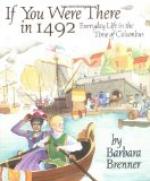Then Columbus goes on to say that these Indians were well made, with very good countenances, but hair like horsehair, their colour yellow; and that they painted themselves. They neither carried arms, nor understood such things, for when he showed them swords, they took hold of them by the blade, and hurt themselves. Their darts were without iron; but some had a fish’s tooth at the end. In concluding his description, he says, “they ought to make faithful servants, and of good understanding, for I see that very quickly they repeat all that is said to them, and I believe they would easily be converted to Christianity, for it appeared to me that they had no creed.”
Their houses and implements.
A little further on, the admiral says of the people of a neighbouring island, that they were more domestic and tractable than those of San Salvador, and more intelligent, too, as he saw in their way of reckoning for the payment of the cotton they brought to the ships. At the mouth of the Rio de Mares, some of the admiral’s men, whom he had sent to reconnoitre, brought him word that the houses of the natives were the best they had seen. They were made, he says, like “Alfaneques (pavilions), very large, and appeared as royal tents without an arrangement of streets, except one here and there, and within they were very clean, and well swept, and their furniture very well arranged. All these houses were made of palm branches, and were very beautiful. Our men found in these houses many statues of women, and several heads fashioned like masks, and very well wrought. I do not know, he adds, whether they have these for the love of the beautiful, or for purposes of worship.” The Spaniards found also excellent nets, fish-hooks, and fishing-tackle. There were tame birds about the houses, and dogs which did not bark. “Mermaids,” too, the admiral saw on the coasts, but thought them “not so like ladies as they are painted.”
Speaking of the Indians of the coast near the Rio del Sol, he says that they are “very gentle, without knowing what evil is, neither killing nor stealing.” He describes the frank generosity of the people of Marien, and the honour they thought it to be asked to give anything, in terms which may remind his readers of the doctrines maintained by Christians in respect of giving.
Discovery of tobacco; its peculiar effects.
It is interesting to observe the way in which, at this point of the narrative, a new product is introduced to the notice of the old world, a product that was hereafter to become, not only an unfailing source of pleasure to a large section of the male part of mankind, from the highest to the lowest, but was also to distinguish itself as one of those commodities for revenue, which are the delight of statesmen, the great financial resource of modern nations, and which afford a means of indirect taxation that has, perhaps, nourished




